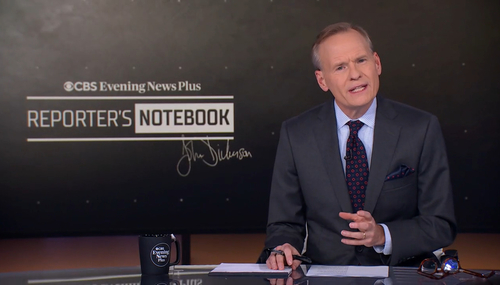
The story’s headline is "Dan Rather’s Last Big Story Is Himself." As he described Rather’s "lower lip jutting out like an ornery fish resisting a hook," Hagan sympathetically recounted:
When Dan Rather sits on a bench in Central Park to tell how his 44-year career at CBS News ended in ignominy and humiliation, he is in fact still waging a war, a bitter and personal one. And the memories of the battles that undid him are still fresh on his mind. "Monday morning, about 8:49 – and I think that is the time precisely," he says. He’s recalling January 10, 2005, when he first received the 224-page report commissioned by CBS that excoriated his infamous 60 Minutes Wednesday segment on President Bush’s National Guard service. Of that report, Rather says, "When I read through it, all I could say to myself, on each page, is, ‘What bullshit. What pure, unadulterated bullshit this whole thing is. What a setup. What a fix.’" He nearly spits the word fix.
Hagan claimed that in 2004, the media were still in a "defensive crouch" against pressure from the Bush team, but Rather was brave enough to seek out phony documents from a disgruntled source:
There had been questions about whether Bush had completed his required Guard duty as early as 2000, but no one had come up with definitive proof that he hadn’t. The Killian documents appeared to be the smoking gun. With USA Today on its heels, CBS felt it had to rush the story on the air—some say the heaviest pressure came directly from Rather. Rather says he repeatedly asked Mapes if the memos were authentic, telling everyone the story was "thermonuclear." When Mapes said they were real, that was good enough for him.
If the story was "thermonuclear," then who is it that Rather was trying to nuke? Considering his get-Bush attitude, it’s a little odd for him then to insist dramatically that he was being executed or assassinated:
CBS declined to comment for this story, beyond releasing a statement saying the company is "mystified and saddened by the baseless and self-serving allegations and distortions of fact raised in [Rather’s] lawsuit." So that leaves us with Rather’s version of what happened next. "The fact is, they caved," he says. "They crumbled." When the documents were savaged by right-wing bloggers and press critics, CBS News found it couldn’t prove their authenticity and backed down. And so, at the time, did Rather...
Two days after the apology, Rather’s faith in his employers was shaken. CBS announced it was commissioning an independent investigation into the flaws of his 60 Minutes Wednesday segment, to be co-chaired by former U.S. attorney general Dick Thornburgh, a Bush family friend and onetime Nixon confidant. Rather felt CBS was handing him over to his enemies for execution. When Heyward informed him that Thornburgh would lead the investigation, Rather was riding in a car in Manhattan with a CBS security guard assigned to him after he’d been mobbed by paparazzi. "I don’t believe what I’m hearing," Rather told him, slamming his fist on the dashboard. "This is un-fucking-believable! You couldn’t have picked anybody who is worse."
Rather says he told Heyward, "‘You can’t do this.’ And he very coldly said, ‘It’s done.’"
Already a chronic insomniac, Rather barely slept now, arriving at his office at 7 a.m. to make frantic calls to anyone and everyone, desperate to glue the story back together. After the 6:30 broadcast of the Evening News, he would stay on the set for hours going over the details. "He was crazed," says a friend. "He looked exhausted."
....Rather and Heyward had known each other since the early eighties, when Rather plucked Heyward from the local New York affiliate to work at the network. Heyward promised they would get through the ordeal together. "He’d gone corporate long before this," says Rather. "Nevertheless, I believed him."
When he describes his eight-hour interrogation before the commission, Rather seems to relive the moment. He can visualize the seating chart of his inquisitors, pointing to exactly where Thornburgh sat. Former Associated Press chief Louis Boccardi was the only journalist on the panel, outnumbered by lawyers, Rather says, with two from Thornburgh’s legal team doing the bulk of the questioning. Thornburgh sat silent and coiled, waiting to interject "like a cobra strikes."
"He’d get up right in your face: ‘Mr. Rather, you mean to tell me that after all of this you’d do a story with Mary Mapes?’ ‘Yessir, that’s exactly what I said.’ And then he’d shake his head," says Rather. "I thought he was a total ass. He tried cheap Perry Mason tactics."
Conservatives thought the Thornburgh panel's report was weak, not scathing. (It punted the question of political bias at CBS.) Then came the part of the story where Angry Dan gets liquored up:
Rather’s shock turned to quiet fury. He stalked the offices, barely acknowledging staffers in the hallways. People referred to this mode as "Defcon 4." "He got progressively, visually angry," says a former colleague. "You don’t want to be in his eyesight when he’s like that." His only release was commiserating on the phone late at night with Mary Mapes; he would announce himself as "Dan Rather, plus three" -- meaning he’d had three glasses of bourbon.
He asked for a meeting with CBS boss Les Moonves to plead his case:
"I’m not sure there’s yet an understanding of what’s happening here," he recalls telling Moonves. "We’ve done a true story, and they’re not denying it because they can’t deny it."
Angry that Mapes and other producers in the pipeline were fired, Rather went passive-aggressive:
But the anger was seething just below the surface. The next night, Rather’s last as anchor of the CBS Evening News, he wore a T-shirt under his suit and tie that read F.E.A.—"Fuck ’em all."
Hagan helpfully suggested that the supposed Killian documents were "never proved real, never proved fake." After a few paragraphs, Dan is being assassinated again:
Like Kennedy trying to solve his own assassination, Rather explored every possible conspiracy theory, from Karl Rove’s planting passable fakes to damage him to a National Guard employee’s typing up copies before the originals were destroyed. "I’ve been down every one of those rabbit holes and 50 more," says Rather, "including people saying, ‘You come up with $200,000 in small bills…’ About that I say, ‘Listen, I’m not going to pay for anything.’"
But Hagan didn’t always allow Rather’s claims of his irrefutable journalistic glory go unchallenged. On the matter of Bill Burkett, the disgruntled, Bush-hating source:
Still, Rather is ultimately relying on the same source who got him into trouble in the first place. Why does he believe his documents are real now? There are two reasons: "First of all," he says, "the story is true. Here is the proof that the story is true: Nobody has ever denied what was reported in the story. President Bush has not denied it, nobody at the White House has denied it, and nobody connected with the Bush administration has denied it." (Actually, Bartlett does deny what CBS reported: "We believe the story is inaccurate, both the general thrust of it and the questionable sources they used," he says. "I’m not a forensic specialist, but many people who are concluded the documents were fraudulent.")
Late in the piece, Hagan assessed how Rather seems to inspire puzzled giggles from colleagues:
Rather’s lawsuit has made him radioactive, even among his allies—many of whom would not speak about him on the record. It has also opened him up to criticism that he held on too long—both to his job and to the story—and, as CBS has stated in its legal rebuttal, that suing is his desperate attempt to return to public significance. Several of his former associates from CBS believe Rather should have bowed out gracefully like NBC’s Tom Brokaw. "He should have gotten out of this place a long time ago," says a 60 Minutes producer. "He seemed to have no ability to make that choice and cross the line. He just moved the line."
Rather insists he’s not just clinging to his public profile. "I can say truthfully I’ve never thought of it that way," he says. "Being on television every day can be egocentric and it can develop an almost egomaniacal quality to it. That’s undeniable. And frankly, if you only do the anchoring work, you’re much more susceptible to that."
People invariably laugh when you ask them to analyze Rather. Even Rather gives a smile and admits that figuring him out "may be full-time work." Still, everyone has an opinion. Some of his friends think he’s brave to take on CBS; others see it as a little tragic. "It’s kind of sad that he feels like he has to do this," says one admirer. "It’s going to zap a lot of his energy." Morley Safer thinks Rather is suing because he "enjoys being a martyr." For his detractors, there is also the whiff of insanity that clings to such a quixotic cause. In conversation, Rather doesn’t seem particularly crazy. But the "Crazy Dan" theme—"Gunga Dan," "Courage," "What’s the frequency, Kenneth?"—still trails him.
"I’ve been a reporter for 58 years," says Rather, not terribly happy that I’ve brought it up. "That old saying, as you go through life your friends fall away and your enemies accumulate -- when you insist on being independent, sometimes with a capital I, people who are highly partisan politically, on all sides of things, when you don’t report things the way they want you to report it, they call you eccentric or wacky or biased or what have you.
"I’m not proud of this, but I fight back," says Rather. "That’s just in my id."




